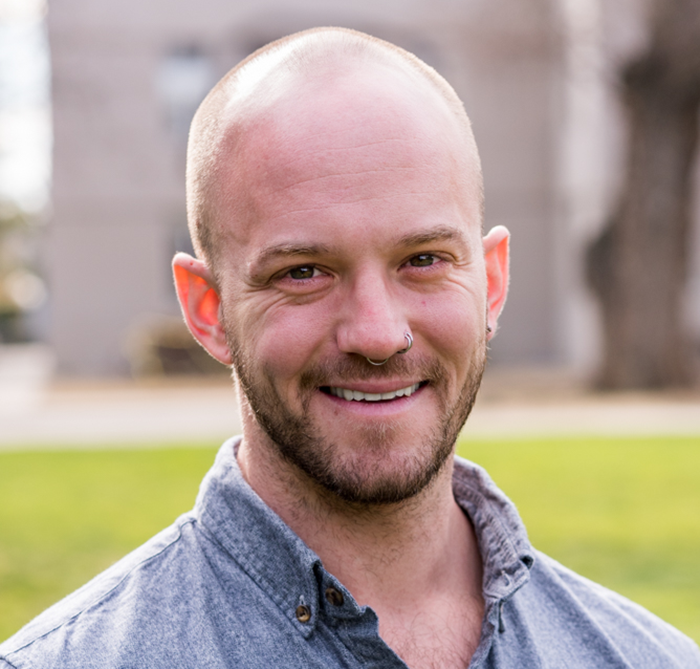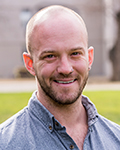We’re taking time over the following weeks to get to know the members of the GSA’s Early Career Scientist Committees. Join us every week to learn more about our early career scientist advocates.
Zach Farrow
Co-chair, Diversity Subcommittee
Novogene, Sacramento, CA
So, you’re the first early career leader that we’ve had in the program that works in industry. Tell us a bit about what you do day to day.
I work as technical support at Novogene, a genetic sequencing and bioinformatics service provider. In my role, I communicate with both the sales department and with customers to provide technical answers and customized solutions. I report market information I come across and work closely with other teams in the company to ensure projects proceed smoothly. I also have the opportunity to attend industry conferences and travel with sales to provide scientific support and presentations occasionally.
How did your background and training prepare you for your current position?
Part of my graduate research involved making a next-gen sequencing library and performing a de novo transcriptome assembly and annotation. I can literally say, “I did this, and this happened” to clients. I think that’s super cool, and it gives me a lot more confidence when giving advice. Having actually done these experiments in the past helps me understand the issues that can arise in the lab and explain to people what went wrong and how we’re solving the problem. This also helps me advise clients on experimental design so they can actually get the results they want from the data they generate.
What challenges did you encounter when pursuing and transitioning into your current position?
Most of the challenges I faced came before my career transition. During graduate school, I felt bullied, ignored, and—at times—degraded. The lab culture was very negative. I was fortunate to find a few supportive professors outside my immediate environment that were helpful, but their support wasn’t enough to overcome the negativity I experienced. Because of this, I knew I did not want to work in academia.
The career center on campus was very helpful. They connected me to potential employers, helped with my resume, and kept me informed about internship opportunities. Most importantly, they checked in on my mental health and wellbeing. I eventually came to understand that my experiences are not unique and that many people in similar situations have come out on the other side. That knowledge helped me keep going.
I will use the adversity I’ve faced to advocate for cultural changes that eliminate academic bullying. I focus my efforts in two arenas: 1) giving students information so they can make informed decisions about their own education and future and 2) pushing for changes in educational systems to give power back to students. To further these ends, I created a seminar in my graduate group for first-year students to ask a panel of older students about their experiences. I am also on the board of directors at the Future of Research (FoR), an organization that aims to empower early career scientists.
I realized that my experience is not a reflection of my work ethic or ability to think, but instead reflects more of a systemic issue within my educational sphere. My adverse experience has made me extremely confident in my abilities; I know that I can rise to almost any challenge, and I know how important a good boss is. This has helped me to know my self-worth and to advocate for myself. I can discern whether or not a specific work culture will help me to grow or will cause me to shrink.
In addition to your work, how else do you want to advance the scientific enterprise?
I want scientists to feel comfortable bringing their authentic selves to their work. I recognize that when my queer identity is valued, I am able to think more creatively and effectively. I’m able to focus on my science instead of worrying about how my sexual orientation is perceived by others. I want to help foster an open scientific environment where diversity is recognized and valued—neither pushed under the rug nor tokenized. I have been part of queer community organizing at professional meetings and would like to continue this, in part by creating space for my own and other communities to come together.
As a leader within the Genetics Society of America, what do you hope to accomplish?
As part of the diversity subcommittee, I will be working to establish a mentoring program. This program not only aims to connect people at different stages in their careers but will also try to match people with similar backgrounds and identities. I want to recognize the diversity of experiences within the scientific community and allow people to have meaningful conversations about how their identities affect their lives and their science.
Previous leadership experience
- Board of Directors—Future of Research
- Sacramento LGBT Community Center, QSpot—Help to create a safe environment for homeless and at risk LGBT youth by providing them space to hang out in the LGBT resource center and providing some survival essentials.
- UC Davis LGBT Resource Center, Mentor Program—Develop intentional relationships with multiple undergraduates who had recently come out and were struggling with their own feelings about their identities and how to navigate the world now that the world perceived them as “different.”
- Mentorship Committee Student Representative—University of California, Davis
- Education Committee Student Representative—University of California, Davis
Contact
































